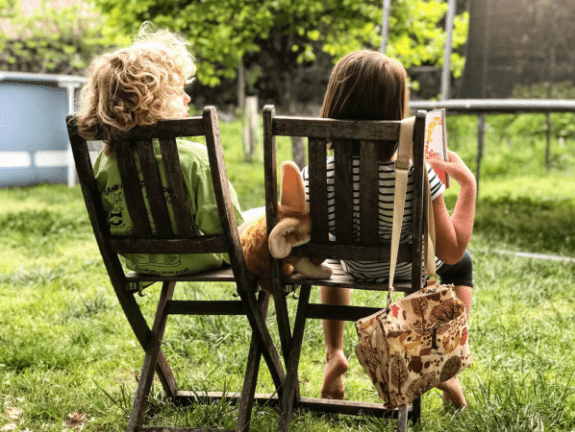What to say to your kids on hard homeschooling days

What to say to your kids on hard homeschooling days ~
Written by Melissa Camara Wilkins
Last Monday, I woke up to find a pool of water on our kitchen floor because our refrigerator had decided to stop refrigerating overnight.
Instead it had thawed every frozen thing inside it, which is really the opposite of what you want a fridge-and-freezer to do. Not my favorite way to start a day, but you know what, these things happen.
I do understand that, intellectually.
I understand that sometimes things break. For example, two hours later, the cold water knob in the bathroom sink snapped clean off, spraying a geyser of water four feet into the air, overflowing the sink, soaking the counter and cupboards and walls, and creating a flood through the garage and all the way out to the street before we could shut off the water supply to the house.
What I don’t understand is why both things needed to happen ON THE SAME DAY.

The weekend before that, we’d done some serious spring cleaning and decluttering, so our trash cans were full before we even began pulling the sopping rolls of unused toilet paper out of the bathroom cupboards and emptying the spoiled food out of the fridge.
And of course the flooded garage needed to be emptied and dried out and sorted, before wet things had a chance to mildew.
And then there was the matter of figuring out how to make meals happen without refrigerated ingredients—for all of the days until a new fridge could be installed. (Keeping a cooler in the kitchen gave the room a fun camping vibe in the meantime, I guess.)
When I called a friend to tell her All The Things, she just listened. There wasn’t much she could do, given that the cascading flood was turned off and every towel we owned had already been used as giant sponges. I just wanted to talk about it.
“I’m here for you,” she said.
I’d had a hard day, and she said exactly what I needed to hear.

Most of our hard days don’t involve cartons of melted ice cream dripping down unfrozen freezer shelves.
Most of the time, hard homeschooling days involve some combination of the usual-but-annoying:
the kids woke up too early and are cranky, we ran out of sliced bread just as everyone planned to make toast for breakfast, someone has someone else’s headphones, the floor is covered in Legos, the counters are covered in dishes, no one has clean socks, and I accidentally snap at everyone because all those Legos and dishes and laundry piles make me feel like I’m being smothered in stuff.
It’s not as dramatic as a fountain of water in the bathroom sink. But the right words still help.
What to Say to Your Kids on Hard Homeschooling Days
Whether someone is stuck trying to understand long division or whether everyone is getting on each other’s nerves, these are some of my favorite words for all those regular-hard-days.

I hear you.
This is pretty much what my friend told me. “I hear you. I see that you’re having a hard time. That is just terrible.” When nothing is going according to plan, we all want to feel seen and understood.
I know you can handle this.
Because they can. Even though I am always SURE I know the best solution to every dilemma ever, plenty of problems DON’T need my help to get solved.
We can figure this out together.
Because other times, they need to know they’re not alone.
What questions do you have?
This one implies that having questions is totally normal, expected, and not a problem.

I’m here if you want to talk.
I like this one better than “what’s bothering you?” or “tell me what’s going on,” because it empowers the kids to decide when and whether they want to open up.
What do you think your body needs right now?
Because nothing’s going to go well if someone is hungry or thirsty or tired, or needs fresh air and sunlight, or if the room is too noisy and bright, or if they’re ready to stretch, or if they need a hug. (I basically always need a hug.)
Tell me more.
I learned this one from Kelly Corrigan’s amazing book (afflink) When my kids do come to me with problems—or even just with stories—I try to make this my first reply. “Tell me more.”
Because while I might THINK I know what’s going on, there’s always more under the surface—and the next right thing to do may not be what I expect at all.
It’s possible that this is what I need to say to my HOUSE right now. Maybe it’s just trying to get my attention. What’s up with all the appliance drama, house? TELL ME MORE. (It hasn’t answered yet.)
What words help the most on your family’s hard homeschooling days? Tell me more!
What’s Your Homeschool Mom Personality? Take Jamie’s quiz now and receive a free personality report to help you organize your homeschool based on what your personality type needs most!

I really needed this post today! It’s been a rough couple of days and as we all know when we are in close quarters together all the time it’s hard to remember some of these things. The frustration between everyone builds and then everything just blows up until things have been resolved. It’s refreshing to have these awesome encouraging posts to read and remember this is just part of the lifestyle of homeschooling and there are going to be difficult days but we can get through them together and become closer as a family and a team each time we do overcome something that could have broken us. Thank you for your time and dedication to putting posts and emails together that are encouraging and that remind us that we are not alone on this crazy journey. Thank you for making me remember that this is just a bump in the road and we will get through it together one thing at a time. 😊
Thank you, Michelle! Yes yes yes–being together in close quarters all the time can be super relationship-building and ALSO super frustrating, depending on the day, right?? If I can remember to expect those frustrating days, I do find that things seem to go a lot smoother. 🙂
Thanks for the suggestions! I’ll add these to my repertoire. I’m all about finding ways to communicate better and support my children’s emotional growth and development!
My 6yo tends to melt down over the slightest problem, so my first words to him are often, “Take a few deep breaths, and then let’s talk about it.” Those deep breaths help him to calm himself a bit and be ready to actually think about the issue at hand instead of just lying on the floor, wailing about it. (In fact, that deep breathing when he’s upset–or even overly excited–is helpful enough that he suggested it recently to a friend who was starting to lose it.)
I’ve also tried hard to acknowledge the ickiness of some of the things in my children’s lives (even though their problem doesn’t seem to me like a big deal). My version of “I hear you,” sometimes sounds like “That DOES sound rough,” or “I can understand that this would be frustrating/upsetting/sad/etc.” And I always follow it with, “What do you think we can do about it?” so that they realize that they aren’t helpless and completely lacking control in the situation (even though they’re young and often really DO need help). Often their suggestions are things like, “Ask for help,” or “I could slow down and try it again.”
Sometimes I use a series of Socratic-style questions to my kiddos. If I can help guide them to a good solution with their own ideas, then they feel empowered while also learning to talk themselves through their problems. Knowing how to ask good questions goes a long way toward being a good problem-solver.
P.S. Having all those things go south for you on the same day is certainly over the top! What a bummer!! I just can’t imagine (even though your words paint a pretty thorough picture)!